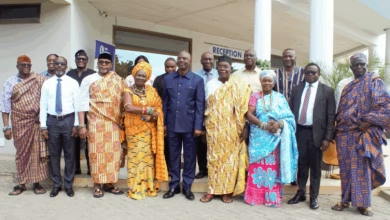Ashanti Region No Longer a Safe Bet for NPP, Analyst Says

- NPP's influence in Ashanti Region declining due to various reasons.
- Anger and tension simmer among NPP supporters in Ashanti Region over perceived discrimination by Nana Akufo-Add
Political Scientist Dr. Amakye Boateng has made a striking analysis of the political landscape in Ghana, suggesting that the New Patriotic Party (NPP) is experiencing a significant decline in its influence within the Ashanti Region. This decline, according to Dr. Boateng, is attributed to the party’s failure to make prudent and strategic decisions during its eight-year tenure, coupled with its indecisiveness in selecting a running mate from the region.
The Ashanti Region, once a formidable stronghold of the NPP, is now showing signs of weakening support, Dr. Boateng emphasized. He noted that the current political climate does not bode well for the party, particularly in its aspirations to extend its rule beyond the traditional two terms.
“The NPP is not strong any longer in the Ashanti Region,” Dr. Boateng stated. “The current context does not favor the NPP; they believe they will break the 8, but I don’t think it will happen. What exactly have they done in the Ashanti Region?” he quizzed, highlighting the party’s perceived lack of achievements in the region.
Dr. Boateng advocated for a strategic move by the NPP and its flag bearer, Mahamudu Bawumia, suggesting that selecting a running mate from the Ashanti Region could potentially rejuvenate the party’s standing. He underscored the importance of regionalism in governance and urged the party to demonstrate its commitment to the Ashanti people.
“There is this feeling in the Ashanti Region that begs the question of the effect of the party in the region,” Dr. Boateng asserted. “So, the running mate issue – if he/she does not come from the Ashanti Region – it will cause turmoil. Choosing the running mate from the region will make the people know they matter in governance and that their views are respected.”
Dr. Boateng emphasized the need for inclusivity in political decision-making, highlighting the importance of regional representation in the party’s leadership. He warned that the party’s failure to address this issue could further erode its support in the region.
Addressing concerns over Mahamudu Bawumia’s shifting focus from the economy to digitization, Dr. Boateng expressed reservations about the move. He contended that the transition has adversely impacted Bawumia’s credibility, particularly in light of the nation’s escalating debt crisis.
“With the country grappling with significant debt burdens, Bawumia’s pivot towards digitalization and away from the economy has raised eyebrows,” Dr. Boateng stated. He highlighted the imperative of addressing economic challenges head-on, rather than diverting attention to other areas.
Dr. Boateng’s analysis has sparked debate among political observers, with some agreeing that the NPP’s influence in the Ashanti Region is waning. Others have argued that the party’s support in the region remains strong, despite some internal challenges.
The NPP’s response to Dr. Boateng’s analysis remains to be seen, but the party’s strategists will likely take note of his warnings and consider the implications for their campaign strategy in the Ashanti Region.






